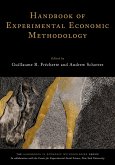The Foundations of Positive and Normative Economics: A Handbook is the first book in a new series by Andrew Caplin and Andrew Schotter. There is currently no guide available on the rapidly changing methodological frontiers of the field of economics. Economists have been introducing new theories and new sources of data at a remarkable rate in recent years, and there are widely divergent views both on how productive these expansions have been in the past, and how best to make progress in the future. The speed of these changes has left economists ill at ease, and has created a backlash against new methods. The series will debate these critical issues, allowing proponents of a particular research method to present proposals in a safe yet critical context, with alternatives being clarified. This first volume, written by some of the most prominent researchers in the discipline, reflects the challenges that are opened by new research opportunities. The goal of the current volume and the series it presages, is to formally open a dialog on methodology. The editors' conviction is that such a debate will rebound to the benefit of social science in general, and economics in particular. The issues under discussion strike to the very heart of the social scientific enterprise. This work is of tremendous importance to all who are interested in the contributions that academic research can make not only to our scientific understanding, but also to matters of policy.
Dieser Download kann aus rechtlichen Gründen nur mit Rechnungsadresse in A, B, BG, CY, CZ, D, DK, EW, E, FIN, F, GR, HR, H, IRL, I, LT, L, LR, M, NL, PL, P, R, S, SLO, SK ausgeliefert werden.









